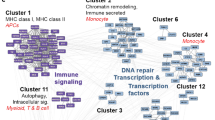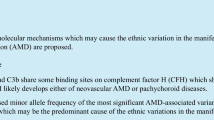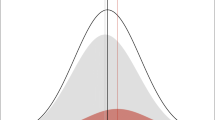Abstract
Many studies have reported the association between the autophagy-related 16-like 1 gene (ATG16L1) T300A polymorphism (rs2241880) and Crohn’s disease (CD) susceptibility, but the results were inconclusive. To derive a more precise estimation of the relationship, a meta-analysis was performed. A total of 24 studies including 13,022 cases and 17,532 controls were included in this meta-analysis. Logistic regression analysis indicated that the ATG16L1 T300A polymorphism was associated with CD risk in Caucasians (P < 0.01). The pooled estimations of OR1 (GG vs. AA) and OR2 (GA vs. AA) in Caucasian studies by Bayesian meta-analysis method was [1.87, 95% confidence interval (CI) 1.69–2.05] and (1.39, 95% CI 1.27–1.51), respectively. The mode of heritance of the G allele was most likely to be co-dominant in Caucasians. However, no significant association was found in Asians. This meta-analysis suggests that the G allele of ATG16L1 T300A is a low-penetrant gene for developing CD in Caucasians.


Similar content being viewed by others
References
Amre DK, Mack DR, Morgan K, Krupoves A, Costea I, Lambrette P, Grimard G, Dong J, Feguery H, Bucionis V, Deslandres C, Levy E, Seidman EG (2009) Autophagy gene ATG16L1 but not IRGM is associated with Crohn’s disease in Canadian children. Inflamm Bowel Dis 15(4):501–507
Baldassano RN, Bradfield JP, Monos DS, Kim CE, Glessner JT, Casalunovo T, Frackelton EC, Otieno FG, Kanterakis S, Shaner JL, Smith RM, Eckert AW, Robinson LJ, Onyiah CC, Abrams DJ, Chiavacci RM, Skraban R, Devoto M, Grant SF, Hakonarson H (2007) Association of the T300A non-synonymous variant of the ATG16L1 gene with susceptibility to paediatric Crohn’s disease. Gut 56:1171–1173
Baptista ML, Amarante H, Picheth G, Sdepanian VL, Peterson N, Babasukumar U, Lima HC, Kugathasan S (2008) CARD15 and IL23R influences Crohn’s disease susceptibility but not disease phenotype in a Brazilian population. Inflamm Bowel Dis 14:674–679
Cummings JR, Cooney R, Pathan S, Anderson CA, Barrett JC, Beckly J, Geremia A, Hancock L, Guo C, Ahmad T, Cardon LR, Jewell DP (2007) Confirmation of the role of ATG16L1 as a Crohn’s disease susceptibility gene. Inflamm Bowel Dis 13:941–946
Duerr RH, Taylor KD, Brant SR, Rioux JD, Silverberg MS, Daly MJ, Steinhart AH, Abraham C, Regueiro M, Griffiths A, Dassopoulos T, Bitton A, Yang H, Targan S, Datta LW, Kistner EO, Schumm LP, Lee AT, Gregersen PK, Barmada MM, Rotter JI, Nicolae DL, Cho JH (2006) A genome-wide association study identifies IL23R as an inflammatory bowel disease gene. Science 314:1461–1463
Egger M, Davey SG, Schneider M, Minder C (1997) Bias in meta-analysis detected by a simple, graphical test. BMJ 315:629–634
Fowler EV, Doecke J, Simms LA, Zhao ZZ, Webb PM, Hayward NK, Whiteman DC, Florin TH, Montgomery GW, Cavanaugh JA, Radford-Smith GL (2008) ATG16L1 T300A shows strong associations with disease subgroups in a large Australian IBD population: further support for significant disease heterogeneity. Am J Gastroenterol 103:2519–2526
Gaj P, Habior A, Mikula M, Ostrowski J (2008) Lack of evidence for association of primary sclerosing cholangitis and primary biliary cirrhosis with risk alleles for Crohn’s disease in Polish patients. BMC Med Genet 9:81
Glas J, Konrad A, Schmechel S, Dambacher J, Seiderer J, Schroff F, Wetzke M, Roeske D, Torok HP, Tonenchi L, Pfennig S, Haller D, Griga T, Klein W, Epplen JT, Folwaczny C, Lohse P, Goke B, Ochsenkuhn T, Mussack T, Folwaczny M, Muller-Myhsok B, Brand S (2008) The ATG16L1 gene variants rs2241879 and rs2241880 (T300A) are strongly associated with susceptibility to Crohn’s disease in the German population. Am J Gastroenterol 103:682–691
Hampe J, Franke A, Rosenstiel P, Till A, Teuber M, Huse K, Albrecht M, Mayr G, De La Vega FM, Briggs J, Gunther S, Prescott NJ, Onnie CM, Hasler R, Sipos B, Folsch UR, Lengauer T, Platzer M, Mathew CG, Krawczak M, Schreiber S (2007) A genome-wide association scan of nonsynonymous SNPs identifies a susceptibility variant for Crohn disease in ATG16L1. Nat Genet 39:207–211
Hancock L, Beckly J, Geremia A, Cooney R, Cummings F, Pathan S, Guo C, Warren BF, Mortensen N, Ahmad T, Jewell D (2008) Clinical and molecular characteristics of isolated colonic Crohn’s disease. Inflamm Bowel Dis 14:1667–1677
Higgins JP, Thompson SG, Deeks JJ, Altman DG (2003) Measuring inconsistency in meta-analyses. BMJ 327:557–560
Ioannidis JP, Ntzani EE, Trikalinos TA (2004) ‘Racial’ differences in genetic effects for complex diseases. Nat Genet 36:1312–1318
Lakatos PL, Szamosi T, Szilvasi A, Molnar E, Lakatos L, Kovacs A, Molnar T, Altorjay I, Papp M, Tulassay Z, Miheller P, Papp J, Tordai A, Andrikovics H (2008) ATG16L1 and IL23 receptor (IL23R) genes are associated with disease susceptibility in Hungarian CD patients. Dig Liver Dis 40:867–873
Lappalainen M, Halme L, Turunen U, Saavalainen P, Einarsdottir E, Farkkila M, Kontula K, Paavola-Sakki P (2008) Association of IL23R, TNFRSF1A, and HLA-DRB1*0103 allele variants with inflammatory bowel disease phenotypes in the Finnish population. Inflamm Bowel Dis 14:1118–1124
Latiano A, Palmieri O, Valvano MR, D’Inca R, Cucchiara S, Riegler G, Staiano AM, Ardizzone S, Accomando S, de Angelis GL, Corritore G, Bossa F, Annese V (2008) Replication of interleukin 23 receptor and autophagy-related 16-like 1 association in adult- and pediatric-onset inflammatory bowel disease in Italy. World J Gastroenterol 14:4643–4651
Libioulle C, Louis E, Hansoul S, Sandor C, Farnir F, Franchimont D, Vermeire S, Dewit O, de Vos M, Dixon A, Demarche B, Gut I, Heath S, Foglio M, Liang L, Laukens D, Mni M, Zelenika D, Van Gossum A, Rutgeerts P, Belaiche J, Lathrop M, Georges M (2007) Novel Crohn disease locus identified by genome-wide association maps to a gene desert on 5p13.1 and modulates expression of PTGER4. PLoS Genet 3:e58
Lunn DJ, Thomas A, Best N, Spiegelhalter D (2000) WinBUGS—a Bayesian modelling framework: concepts, structure, and extensibility. Stat Comput 10:325–327
Minelli C, Thompson JR, Abrams KR, Lambert PC (2005a) Bayesian implementation of a genetic model-free approach to the meta-analysis of genetic association studies. Stat Med 24:3845–3861
Minelli CT, Abrams JohnR, KRT Ammarin, Attia J (2005b) The choice of a genetic model in the meta-analysis of molecular association studies. Int J Epidemiol 34:1319–1328
Okazaki T, Wang MH, Rawsthorne P, Sargent M, Datta LW, Shugart YY, Bernstein CN, Brant SR (2008) Contributions of IBD5, IL23R, ATG16L1, and NOD2 to Crohn’s disease risk in a population-based case-control study: evidence of gene-gene interactions. Inflamm Bowel Dis 14:1528–1541
Perricone C, Borgiani P, Romano S, Ciccacci C, Fusco G, Novelli G, Biancone L, Calabrese E, Pallone F (2008) ATG16L1 Ala197Thr is not associated with susceptibility to Crohn’s disease or with phenotype in an Italian population. Gastroenterology 134:368–370
Peterson N, Guthery S, Denson L, Lee J, Saeed S, Prahalad S, Biank V, Ehlert R, Tomer G, Grand R, Rudolph C, Kugathasan S (2008) Genetic variants in the autophagy pathway contribute to paediatric Crohn’s disease. Gut 57:1336–1337
Prescott NJ, Fisher SA, Franke A, Hampe J, Onnie CM, Soars D, Bagnall R, Mirza MM, Sanderson J, Forbes A, Mansfield JC, Lewis CM, Schreiber S, Mathew CG (2007) A nonsynonymous SNP in ATG16L1 predisposes to ileal Crohn’s disease and is independent of CARD15 and IBD5. Gastroenterology 132:1665–1671
Rioux JD, Xavier RJ, Taylor KD, Silverberg MS, Goyette P, Huett A, Green T, Kuballa P, Barmada MM, Datta LW, Shugart YY, Griffiths AM, Targan SR, Ippoliti AF, Bernard EJ, Mei L, Nicolae DL, Regueiro M, Schumm LP, Steinhart AH, Rotter JI, Duerr RH, Cho JH, Daly MJ, Brant SR (2007) Genome-wide association study identifies new susceptibility loci for Crohn disease and implicates autophagy in disease pathogenesis. Nat Genet 39:596–604
Roberts RL, Gearry RB, Hollis-Moffatt JE, Miller AL, Reid J, Abkevich V, Timms KM, Gutin A, Lanchbury JS, Merriman TR, Barclay ML, Kennedy MA (2007) IL23R R381Q and ATG16L1 T300A are strongly associated with Crohn’s disease in a study of New Zealand Caucasians with inflammatory bowel disease. Am J Gastroenterol 102:2754–2761
Sartor RB (2006) Mechanisms of disease: pathogenesis of Crohn’s disease and ulcerative colitis. Nat Clin Pract Gastroenterol Hepatol 3:390–407
Schmid D, Dengjel J, Schoor O, Stevanovic S, Munz C (2006) Autophagy in innate and adaptive immunity against intracellular pathogens. J Mol Med 84:194–202
Thakkinstian A, McElduff P, D’Este C, Duffy D, Attia J (2005a) A method for meta-analysis of molecular association studies. Stat Med 24:1291–1306
Thakkinstian A, McEvoy M, Minelli C, Gibson P, Hancox B, Duffy D, Thompson J, Hall I, Kaufman J, Leung TF, Helms PJ, Hakonarson H, Halpi E, Navon R, Attia J (2005b) Systematic review and meta-analysis of the association between β2-adrenoceptor polymorphisms and asthma: a HuGE review. Am J Epidemiol 162:201–211
The Wellcome Trust Case Control Consortium (2007) Genome-wide association study of 14, 000 cases of seven common diseases and 3, 000 shared controls. Nature 447:661–678
Thompson SG, Smith TC, Sharp SJ (1997) Investigating underlying risk as a source of heterogeneity in meta-analysis. Stat Med 16:2741–2758
Van Limbergen J, Russell RK, Nimmo ER, Drummond HE, Smith L, Anderson NH, Davies G, Gillett PM, McGrogan P, Weaver LT, Bisset WM, Mahdi G, Arnott ID, Wilson DC, Satsangi J (2008) Autophagy gene ATG16L1 influences susceptibility and disease location but not childhood-onset in Crohn’s disease in Northern Europe. Inflamm Bowel Dis 14:338–346
Weersma RK, Zhernakova A, Nolte IM, Lefebvre C, Rioux JD, Mulder F, van Dullemen HM, Kleibeuker JH, Wijmenga C, Dijkstra G (2008) ATG16L1 and IL23R are associated with inflammatory bowel diseases but not with celiac disease in the Netherlands. Am J Gastroenterol 103:621–627
Weersma RK, Stokkers PC, van Bodegraven AA, van Hogezand RA, Verspaget HW, de Jong DJ, van der Woude CJ, Oldenburg B, Linskens RK, van der Steege G, Festen EA, Hommes DW, Crusius JB, Wijmenga C, Nolte IM, Dijkstra G (2009) Molecular prediction of disease risk and severity in a large Dutch Crohn’s disease cohort. Gut 58(3):388–395
Yamazaki K, Onouchi Y, Takazoe M, Kubo M, Nakamura Y, Hata A (2007) Association analysis of genetic variants in IL23R, ATG16L1 and 5p13.1 loci with Crohn’s disease in Japanese patients. J Hum Genet 52:575–583
Zhi J, Zhi FC, Chen ZY, Yao GP, Guan J, Lin Y, Zhang YC (2008) Correlation of the autophagosome gene ATG16L1 polymorphism and inflammatory bowel disease. Nan Fang Yi Ke Da Xue Xue Bao 28:649–665
Author information
Authors and Affiliations
Corresponding authors
Additional information
H.-F. Zhang, L.-X. Qiu and Y. Chen have contributed equally to this work and should be considered as co-first authors.
Electronic supplementary material
Below is the link to the electronic supplementary material.
Rights and permissions
About this article
Cite this article
Zhang, HF., Qiu, LX., Chen, Y. et al. ATG16L1 T300A polymorphism and Crohn’s disease susceptibility: evidence from 13,022 cases and 17,532 controls. Hum Genet 125, 627–631 (2009). https://doi.org/10.1007/s00439-009-0660-7
Received:
Accepted:
Published:
Issue Date:
DOI: https://doi.org/10.1007/s00439-009-0660-7




